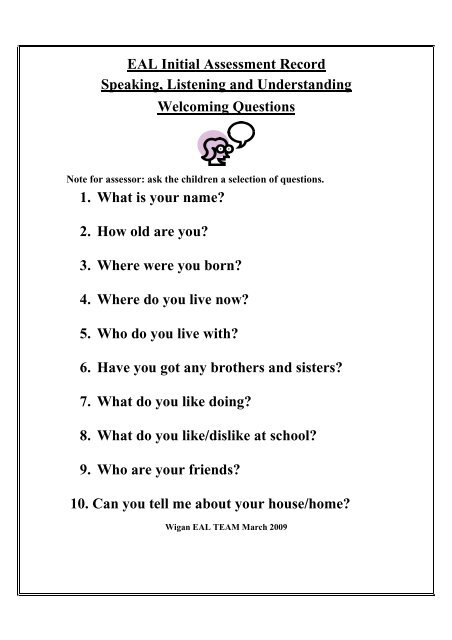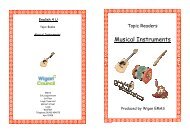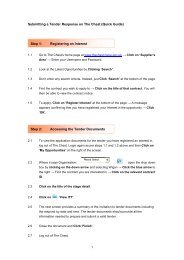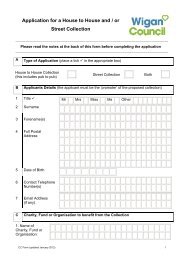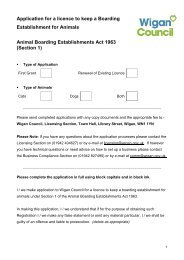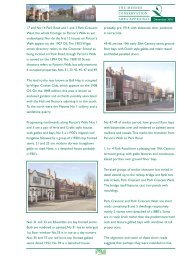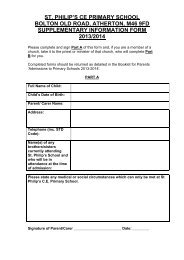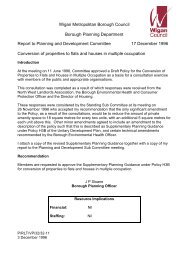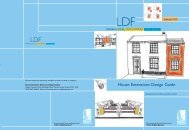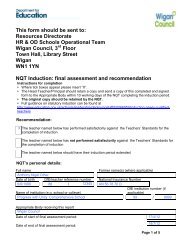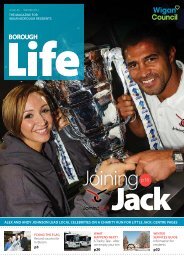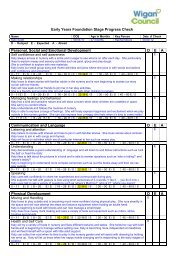EAL Pupil Assessment Booklet
EAL Pupil Assessment Booklet
EAL Pupil Assessment Booklet
Create successful ePaper yourself
Turn your PDF publications into a flip-book with our unique Google optimized e-Paper software.
<strong>EAL</strong> Initial <strong>Assessment</strong> Record<br />
Speaking, Listening and Understanding<br />
Welcoming Questions<br />
Note for assessor: ask the children a selection of questions.<br />
1. What is your name?<br />
2. How old are you?<br />
3. Where were you born?<br />
4. Where do you live now?<br />
5. Who do you live with?<br />
6. Have you got any brothers and sisters?<br />
7. What do you like doing?<br />
8. What do you like/dislike at school?<br />
9. Who are your friends?<br />
10. Can you tell me about your house/home?<br />
Wigan <strong>EAL</strong> TEAM March 2009
<strong>EAL</strong> Initial <strong>Assessment</strong> Record<br />
Speaking, Listening and Understanding<br />
Picture/Photo Discussion<br />
Note for assessor: make use of other photographs/pictures to<br />
question children. E.g. Book of First1000 Everyday Words.<br />
Wigan <strong>EAL</strong> TEAM March 2009
<strong>EAL</strong> Initial <strong>Assessment</strong> Record<br />
Naming Everyday Objects<br />
Note for assessor: ask the children about a wider range of objects from<br />
picture dictionaries.<br />
Wigan <strong>EAL</strong> TEAM March 2009
<strong>EAL</strong> Initial <strong>Assessment</strong> Record<br />
Naming Colours (no words)<br />
Note for assessor: check to see if children can name colours with and<br />
without words. See next page.<br />
Wigan <strong>EAL</strong> TEAM March 2009
<strong>EAL</strong> Initial <strong>Assessment</strong> Record<br />
Naming Colours (words)<br />
Note for assessor: check to see if children can name colours with and<br />
without words. See previous page.<br />
red<br />
green<br />
pink<br />
yellow<br />
brown<br />
purple<br />
white<br />
orange<br />
black<br />
blue<br />
grey<br />
Wigan <strong>EAL</strong> TEAM March 2009
<strong>EAL</strong> Initial <strong>Assessment</strong> Record<br />
Grapheme to Phoneme<br />
Lower Case Letters (phoneme and name)<br />
Note for assessor: cover up other table when accessing lower/upper case<br />
alphabet.<br />
z e s a l p<br />
n b g x m k<br />
t q c j i r<br />
d f o u h v<br />
y<br />
w<br />
Upper Case Letters (phoneme and name)<br />
Z E S A L P<br />
N B G X M K<br />
T Q C J I R<br />
D F O U H V<br />
Y<br />
W<br />
Wigan <strong>EAL</strong> TEAM March 2009
<strong>EAL</strong> Initial <strong>Assessment</strong> Record<br />
Phoneme Check – Blends and digraphs<br />
Blends<br />
bl br cl cr dr fl fr gl<br />
gr pl pr sl sk sp st sw<br />
tr tw<br />
Digraphs<br />
sh ch th<br />
th<br />
ng oo ee<br />
voiced<br />
unvoiced<br />
ou er oi ar ai ue or<br />
Wigan <strong>EAL</strong> TEAM March 2009
<strong>EAL</strong> Initial <strong>Assessment</strong> Record<br />
Phoneme to grapheme<br />
Note to assessor: ask the children to write down a selection of lower and<br />
upper case letters.<br />
Wigan <strong>EAL</strong> TEAM March 2009
<strong>EAL</strong> Initial <strong>Assessment</strong> Record<br />
Reading and Spelling of High Frequency Words<br />
a an as at if in is it of off<br />
on can dad had back and get big him his<br />
not got up mum but put the to I no<br />
go into will that this then them with see for<br />
now down look too he she we me be was<br />
you they all are my her went it’s from children<br />
just help said have like so do some come were<br />
there little one when out what don’t old I’m by<br />
time house about your day made came make here saw<br />
very oh their people Mr Mrs looked called asked could<br />
Tricky Words in yellow
<strong>EAL</strong> Initial <strong>Assessment</strong> Record<br />
Reading in First Language<br />
Note for assessor: may be necessary for bilingual speaker to assess. Locate another appropriate text in relevant<br />
language if necessary.<br />
Urdu<br />
Wigan <strong>EAL</strong> TEAM March 2009
<strong>EAL</strong> Initial <strong>Assessment</strong> Record<br />
Reading in First Language<br />
Note for assessor: may be necessary for bilingual speaker to assess. Locate another appropriate text in relevant<br />
language if necessary.<br />
It was Elmer who kept the elephants happy. Sometimes he<br />
joked with the other elephants, sometimes they joked with<br />
him. But if there was even a little smile, it was usually<br />
Elmer who started it.<br />
English<br />
Wigan <strong>EAL</strong> TEAM March 2009
<strong>EAL</strong> Initial <strong>Assessment</strong> Record<br />
Reading in First Language<br />
Note for assessor: may be necessary for bilingual speaker to assess. Locate another appropriate text in relevant<br />
language if necessary.<br />
Slovak<br />
Wigan <strong>EAL</strong> TEAM March 2009
<strong>EAL</strong> Initial <strong>Assessment</strong> Record<br />
Reading in First Language<br />
Note for assessor: may be necessary for bilingual speaker to assess. Locate another appropriate text in relevant<br />
language if necessary.<br />
Polish<br />
Wigan <strong>EAL</strong> TEAM March 2009
<strong>EAL</strong> Initial <strong>Assessment</strong> Record<br />
Reading in First Language<br />
Note for assessor: may be necessary for bilingual speaker to assess. Locate another appropriate text in relevant<br />
language if necessary.<br />
Czech<br />
Wigan <strong>EAL</strong> TEAM March 2009
<strong>EAL</strong> Initial <strong>Assessment</strong> Record<br />
Reading in First Language<br />
Note for assessor: may be necessary for bilingual speaker to assess. Locate another appropriate text in relevant<br />
language if necessary.<br />
Russian<br />
Wigan <strong>EAL</strong> TEAM March 2009
<strong>EAL</strong> Initial <strong>Assessment</strong> Record<br />
Writing<br />
(Own Language/English)<br />
Wigan <strong>EAL</strong> TEAM March 2009
<strong>EAL</strong> Initial <strong>Assessment</strong> Record<br />
Recognising Numbers 0-20 in Figures<br />
9 4 2 7 0 3 6 10 1 8 5<br />
14 12 18 13 20 11 17 16 19 15<br />
Wigan <strong>EAL</strong> TEAM March 2009
<strong>EAL</strong> Initial <strong>Assessment</strong> Record<br />
One Hundred Grid Number Recognition<br />
1 2 3 4 5 6 7 8 9 10<br />
11 12 13 14 15 16 17 18 19 20<br />
21 22 23 24 25 26 27 28 29 30<br />
31 32 33 34 35 36 37 38 39 40<br />
41 42 43 44 45 46 47 48 49 50<br />
51 52 53 54 55 56 57 58 59 60<br />
61 62 63 64 65 66 67 68 69 70<br />
71 72 73 74 75 76 77 78 79 80<br />
81 82 83 84 85 86 87 88 89 90<br />
91 92 93 94 95 96 97 98 99 100<br />
179 273 386 602 820 947 1000 1003 1900 2068 2905 3971<br />
4502 5002 6013 7600 8893 8430 9904 10000 10302 10800 19028
<strong>EAL</strong> Initial <strong>Assessment</strong> Record<br />
Numeracy<br />
Recognising Numbers in Words 1<br />
one<br />
two<br />
three<br />
four<br />
five<br />
six<br />
seven<br />
eight<br />
nine<br />
ten<br />
zero<br />
Wigan <strong>EAL</strong> TEAM March 2009
<strong>EAL</strong> Initial <strong>Assessment</strong> Record<br />
Numeracy<br />
Recognising Numbers in Words 2<br />
eleven<br />
sixteen<br />
fourteen<br />
twelve<br />
twenty<br />
eighteen<br />
fifteen<br />
thirteen<br />
nineteen<br />
seventeen<br />
Wigan <strong>EAL</strong> TEAM March 2009
<strong>EAL</strong> Initial <strong>Assessment</strong> Record<br />
Ordering Numbers 0-20<br />
Note for assessor: ask the child to write numbers within 0-20 as appropriate using a dry wipe pen.<br />
(0-10)<br />
(11-20)<br />
Wigan <strong>EAL</strong> TEAM March 2009
<strong>EAL</strong> Initial <strong>Assessment</strong> Record<br />
Ordering Numbers on a 100 Grid<br />
Note for assessor: ask the child to write a selection of numbers on the grid using a dry wipe pen.<br />
Wigan <strong>EAL</strong> TEAM March 2009
<strong>EAL</strong> Initial <strong>Assessment</strong> Record<br />
Calculation Strategies<br />
Note for assessor: make notes about how the child solves these<br />
calculations on the record sheet. Also note if they understand the<br />
mathematical symbols. Extend calculations if appropriate.<br />
5 + 3 =<br />
8 + 6 =<br />
9 + 12 =<br />
14 + 7 =<br />
23 + 16 =<br />
48 + 34 =<br />
28 + 54 =<br />
2 x 5 =<br />
10 x 0 =<br />
4 x 3 =<br />
10 x 6 =<br />
5 x 4 =<br />
7 x 8 =<br />
4 x 9 =<br />
7 – 3 =<br />
10 – 4 =<br />
14 – 10 =<br />
18 – 9 =<br />
28 – 15 =<br />
39 – 21 =<br />
63 – 36 =<br />
4 – 2 =<br />
6 – 3 =<br />
10 – 5 =<br />
12 – 4 =<br />
16 – 8 =<br />
20 – 10 =<br />
24 – 6 =
<strong>EAL</strong> Initial <strong>Assessment</strong> Record<br />
2D Shapes – without words<br />
Wigan <strong>EAL</strong> TEAM March 2009
<strong>EAL</strong> Initial <strong>Assessment</strong> Record<br />
2D Shapes Word Match<br />
Circle Triangle Oblong<br />
Square Pentagon Hexagon<br />
Wigan <strong>EAL</strong> TEAM March 2009
<strong>EAL</strong> Initial <strong>Assessment</strong> Record<br />
3D Shapes Word Match<br />
Note for assessor: use solid 3D shapes to assess recognition.<br />
Sphere<br />
Cylinder<br />
Cuboid<br />
Cube<br />
Pyramid<br />
Cone<br />
Wigan <strong>EAL</strong> TEAM March 2009
<strong>EAL</strong> Initial <strong>Assessment</strong> Record<br />
Days of the Week<br />
1. Ask the children if they can say the days of<br />
the week in order.<br />
2. Ask the children if they can read the words.<br />
Friday<br />
Wednesday<br />
Sunday<br />
Thursday<br />
Monday<br />
Saturday<br />
Tuesday<br />
3. Ask the children sequencing questions. E.g.<br />
What day comes before Tuesday or after<br />
Saturday?<br />
Wigan <strong>EAL</strong> TEAM March 2009
<strong>EAL</strong> Children<br />
Initial <strong>Assessment</strong> Record<br />
Name of child<br />
D.O.B.<br />
Gender<br />
Ethnicity<br />
Languages (Written and spoken)<br />
Country born<br />
Date admitted to UK<br />
Date admitted to school<br />
Class<br />
Any other relevant information<br />
E.g. previous<br />
schooling/medical/family<br />
INITIAL ENGLISH ASSESSMENT<br />
Aspects of English Notes NASSEA<br />
STEP<br />
Listening and Understanding<br />
NC<br />
LEVEL<br />
Speaking<br />
Reading<br />
Writing<br />
Additional knowledge, skills and understanding:<br />
(E.g. Mathematical Vocab)<br />
Profile completed by:<br />
Date:<br />
Wigan <strong>EAL</strong> TEAM March 2009
Speaking, Listening and Understanding inc. Basic<br />
Vocabulary<br />
Welcoming Questions<br />
Picture/Photo Discussion<br />
Naming Everyday Objects<br />
Naming Colours<br />
Grapheme to Phoneme<br />
P = Phoneme<br />
N = Name<br />
Phonics – Reading, Spelling and Writing<br />
z e s a l p<br />
n b g x m k<br />
t q c j i r<br />
d f o u h v<br />
y w<br />
Z E S A L P<br />
N B G X M K<br />
T Q C J I R<br />
D F O U H V<br />
Y W<br />
Wigan <strong>EAL</strong> TEAM March 2009
Phoneme to Grapheme<br />
Blends and Digraphs<br />
High Frequency Words – Reading and Spelling<br />
R = Read<br />
S = Spell<br />
a an as at if in is it of off<br />
on can dad had back and get big him his<br />
not got up mum but put the to I no<br />
go into will that this then them with see for<br />
now down look too he she we me be was<br />
you they all are my her went it’s from children<br />
just help said have like so do some come were<br />
there little one when out what don’t old I’m by<br />
time house about your day made came make here saw<br />
very oh their people Mr Mrs looked called asked could<br />
Tricky Words shaded<br />
Reading in Own Language<br />
Writing<br />
Please mark and attach writing<br />
sheet to this record.<br />
Numeracy<br />
Recognition 0-20 in Figures<br />
Tick known numbers<br />
0 1 2 3 4 5 6 7 8 9 10<br />
11 12 13 14 15 16 17 18 19 20<br />
Wigan <strong>EAL</strong> TEAM March 2009
Recognition 0-100<br />
Tick known numbers<br />
1 2 3 4 5 6 7 8 9 10<br />
11 12 13 14 15 16 17 18 19 20<br />
21 22 23 24 25 26 27 28 29 30<br />
31 32 33 34 35 36 37 38 39 40<br />
41 42 43 44 45 46 47 48 49 50<br />
51 52 53 54 55 56 57 58 59 60<br />
61 62 63 64 65 66 67 68 69 70<br />
71 72 73 74 75 76 77 78 79 80<br />
81 82 83 84 85 86 87 88 89 90<br />
91 92 93 94 95 96 97 98 99 100<br />
Recognition 100+<br />
Reading Numbers in Words 0-20<br />
Tick known words<br />
zero one two three four five six<br />
seven eight nine ten eleven twelve thirteen<br />
fourteen fifteen sixteen seventeen eighteen nineteen twenty<br />
Ordering Numbers 0-20<br />
Ordering Numbers 0-100<br />
Wigan <strong>EAL</strong> TEAM March 2009
Writing Numbers<br />
Calculation Strategies<br />
2D Shapes<br />
3D Shapes<br />
Days of the Week<br />
If appropriate assess other aspects<br />
of time.<br />
Additional Comments (if appropriate)<br />
Wigan <strong>EAL</strong> TEAM March 2009


